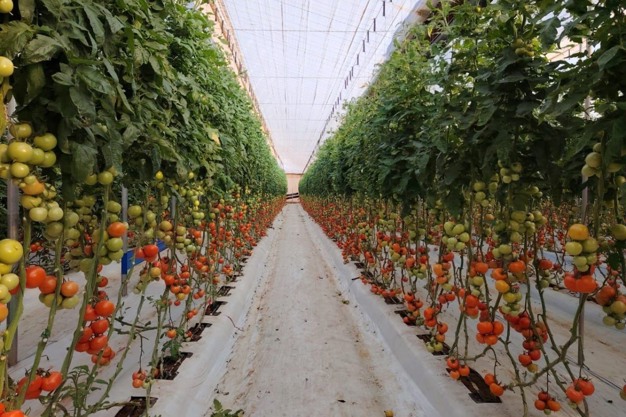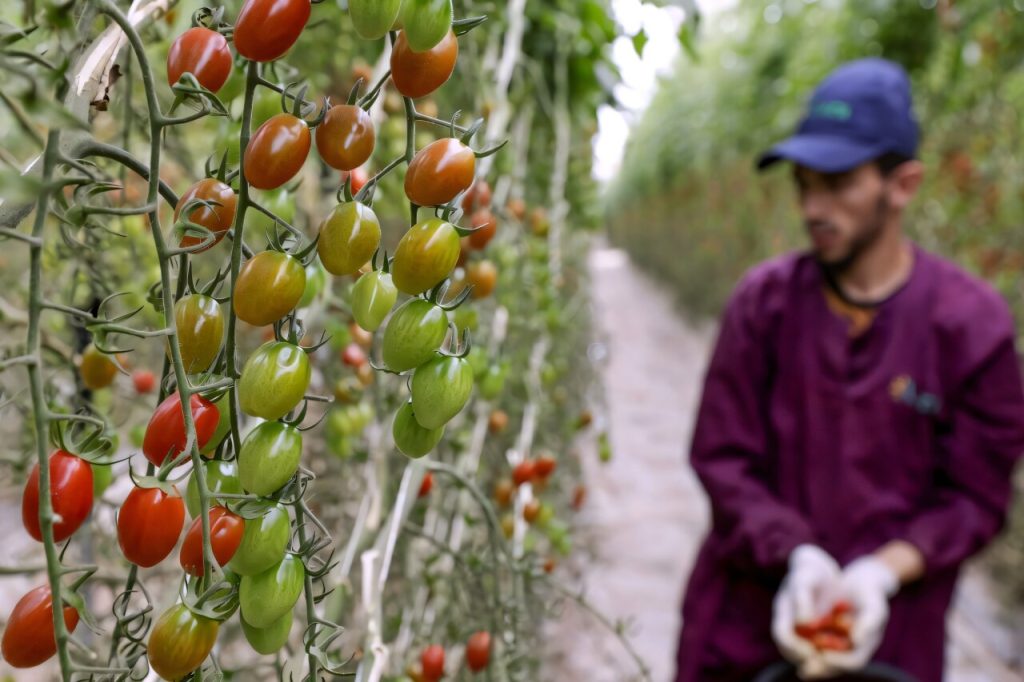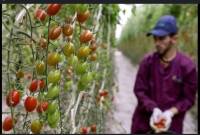
In recent months, speculation has swirled around Morocco’s premier greenhouse tomato producer, Azura (part of Groupe Agricole Tazi – GAT). Reports suggest the company may be going bust, while others argue it’s merely restructuring behind the scenes. In this in-depth analysis, we explore the financial landscape, environmental challenges, export performance, and strategic sustainability that underpin Azura’s journey.
Sustainability Strategy & Climate Pressure
Azura, founded in 1988 as a Franco-Moroccan family venture, specializes in greenhouse-grown cherry and vine tomatoes—spanning more than 1,277 hectares across Agadir and Dakhla :contentReference[oaicite:2]{index=2}. The group touts energy-efficient open-roof greenhouses powered by solar radiation—eliminating heating and artificial lighting—resulting in lower carbon emissions than conventional heated European facilities :contentReference[oaicite:3]{index=3}.
In 2024, Azura became the first Moroccan company—and the world’s largest agricultural operation—to be certified by the Alliance for Water Stewardship (AWS), ensuring disciplined use of water resources :contentReference[oaicite:4]{index=4}. The company also achieved Science Based Targets initiative (SBTi) approval, cementing its sustainable ambitions :contentReference[oaicite:5]{index=5}.
Yet Morocco has been gripped by a six‑ to seven‑year severe drought, forcing reliance on desalinated water. Today, Azura depends entirely on desalinated water for its 800 hectares near Chtouka and Agadir :contentReference[oaicite:6]{index=6}.
Desalination: Lifeline or Liability?
Since 2022, a major desalination plant near Agadir has supplied 125,000 m³/day of desalinated water—supporting 12,000 ha of farmland and 1.6 million residents :contentReference[oaicite:7]{index=7}. This is set to increase to 400,000 m³/day by late 2026, largely for agriculture.
However, desalinated water is costly—roughly \$0.56/m³ vs \$0.11/m³ for traditional irrigation, even with a 40 % subsidy :contentReference[oaicite:8]{index=8}. Only high-value crops, like cherry tomatoes, can absorb such price pressure :contentReference[oaicite:9]{index=9}.
Environmental concerns add another layer; North Africa continues to rely heavily on coal (62 % of electricity in 2023) :contentReference[oaicite:10]{index=10}, making water desalination energy‑intensive. Although high‑salinity brine from the process is diluted, the long‑term effect on marine habitats remains debated :contentReference[oaicite:11]{index=11}.
Export Dynamics & Market Tensions
Azura remains one of the top 10 cherry tomato brands in France :contentReference[oaicite:12]{index=12}, showcasing strong ties with European supermarkets via its platform in Perpignan :contentReference[oaicite:13]{index=13}.
In 2024–25, Morocco exported ~690,000 t of tomatoes, a 19 % increase; the UK imported 122,700 t (68 % snack types), and Germany directly imported 98,400 t, bypassing traditional French brokers :contentReference[oaicite:14]{index=14}.
That global scale, however, has triggered protests from French producers, who allege “unfair competition” due to low labor costs and EU‑Morocco trade perks :contentReference[oaicite:15]{index=15}. Moroccan growers defend their position, noting quotas and compliance rules to prevent dumping under EU law :contentReference[oaicite:16]{index=16}.
Risks: Drought, Disease & Labor Shortages
Prolonged drought continues to threaten yields. Recent cooler weather saw yields drop from 1,000–1,200 kg/ha per day to 500 kg/ha per day in Souss-Massa :contentReference[oaicite:17]{index=17}.
Disease outbreaks, particularly the Tomato Brown Rugose Fruit Virus (ToBRFV), have hit production with losses between 15 %–20 % in 2023–24 :contentReference[oaicite:18]{index=18}. Though resistant varieties are emerging, large-fruited types remain vulnerable :contentReference[oaicite:19]{index=19}.
Labor constraints further complicate matters. With agricultural wages ~1.50 € per hour, many seasonal workers move to other crops like berries, viewed as higher earnings and less risky :contentReference[oaicite:20]{index=20}. Sub-Saharan migrant labor partly offsets this, but only 10 % of costs are subsidized :contentReference[oaicite:21]{index=21}.

Is Azura Going Bust—or Restructuring?
Some sources imply insolvency at GAT/Azura, but deep-dives into public and trade data reveal an active enterprise with €500 m in annual turnover and 18,000 employees across Morocco & Europe :contentReference[oaicite:22]{index=22}.
The 2024 AWS and SBTi certifications, along with investments in aquaculture and logistics, signal a long-term strategic pivot—not collapse :contentReference[oaicite:23]{index=23}.
That said, adopting desalination has squeezed margins, forcing Azura to “sacrifice some margin … or close up shop,” in the words of production chief Abir Lemseffer :contentReference[oaicite:24]{index=24}. Restructuring likely targets cost efficiency via automation and vertical integration in seed production, packaging, aquaculture, and waste recycling :contentReference[oaicite:25]{index=25}.
Tomorrow’s Outlook for Azura
- Export Focused: With Europe craving Moroccan tomatoes, particularly cherry variety, direct shipments to UK and Germany are set to grow :contentReference[oaicite:26]{index=26}.
- Innovation Driven: Deployment of disease-resistant seeds, AI-lighting experiments, and diversified product lines (herbs, aquaculture) bolster resilience :contentReference[oaicite:27]{index=27}.
- Sustainability Cred: AWS and SBTi labels must earn consumer trust in Europe, countering critiques from French rivals :contentReference[oaicite:28]{index=28}.
- Water Crisis Mitigation: Scaling up desalination, smarter irrigation, and drought-resistant crops offer some security—if water pricing and carbon footprint can be managed.
- Labor & Logistics: Automation, optimized supply chains, and recruitment reforms will ease labor gaps and cost pressures.
Conclusion
Despite hardships—the cost of desalination, climate strain, disease outbreaks, and labor scarcity—evidence does not point to immediate insolvency for Azura or GAT. Instead, significant investments in sustainability, innovation, and vertical integration signal a major restructuring—intended to secure the company’s future.
Whether the strategy pays off depends on global demand for sustainable, high‑value produce, regulatory pressure on water and carbon use, and the ability to maintain profitability in a low‑margin commodity business.
Contents
- Sustainability Strategy & Climate Pressure
- Desalination: Lifeline or Liability?
- Export Dynamics & Market Tensions
- Risks: Drought, Disease & Labor Shortages
- Is Azura Going Bust—or Restructuring?
- Tomorrow’s Outlook for Azura
- Conclusion
For everything new please visit our website: africaciviclens.com




